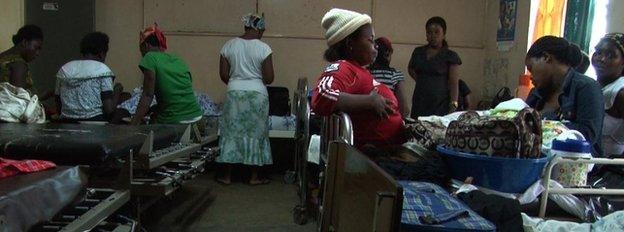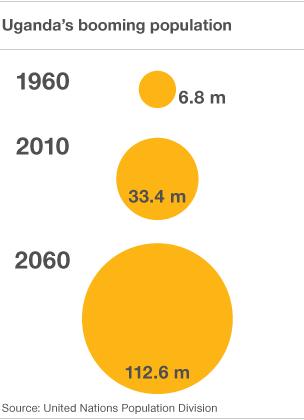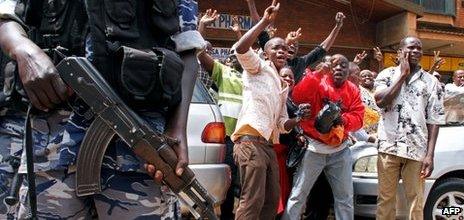Can Uganda cope with three times as many people?
- Published

Uganda's maternity wards are extremely busy places
As Uganda marks the 50th anniversary of its independence from the UK, the BBC's Catherine Byaruhanga looks forward to the country's next 50 years - when the population is set to triple.
The two midwives on duty at Kawempe Health Centre IV, in the north of Uganda's capital, Kampala, are rushed off their feet.
There are two basic labour rooms, they look old and the once white walls are in need of a new lick of paint.
Both are packed with beds and medical equipment - these too look like they need some updating.
"Sometimes you're helping one mother and then two or three start collapsing, needing your attention," the head of the maternity ward, Sarah Kintu, told the BBC.
"At times there are just 10-minute intervals between the births.
"You finish moving one mother and cleaning the place then you have to bring in another."
Seven people per room
For Naigaga Sainah, giving birth for the fifth time seemed a fairly matter-of-fact event.
She arrived at the health centre in the morning with contractions, gave birth in the afternoon, and went home in the evening.
There were no tears or screams, she just grimaced, held her stomach and would not speak.
It is a scene repeated across the country.

Uganda has one of the fastest growing populations in the world, at almost 3% each year.
On average women here have about six children.
It is estimated that by 2060, Uganda's population will soar from 35 million today to more than 112 million.
But Ugandans are wondering how they will be able to provide for such a large number of people.
For Mrs Sainah, her worry is how to take care of her family.
I visit her once she is back home - a few miles away from the health centre.
It is a one-room apartment separated by a curtain to create a small living room and a bedroom that she shares with her husband and children.
It is basic but tidy and well decorated.
Her face is glowing and she greets me with a warm smile though she is rushed off her feet.
She is busy bathing the children and making them some breakfast. You would never guess she has just given birth.
"Right now I am not working but my husband works. So the little that we get is what we use to take of our five children," she says.
"For now, I would like to stop having more kids and plan for these children. Once I feel like I'm in a better position I will have more children - maybe two or three.
"My husband and I both like having a big family and if I educate them properly when they grow up they can take care of me."
'Uganda has more resources'
Uganda's President Yoweri Museveni would also like to have more Ugandans as he believes a large population can be a boost for the economy.
It will provide a bigger labour force and more consumers for the country's businesses.
The president, who has been in power for 26 years, is not worried about providing for future generations.
"The UK is the same size as Uganda. It has a population of 60-something million now. And they're all living comfortably," he said at a presidential lecture to mark 50 years of Uganda's independence.
"And they don't have the resources of Uganda. Uganda has got more resources than all those countries we're talking about."
But the government will need to provide more public services like health and education.
It will also need to make sure that its economy can supply future generations with the jobs.
Government critics argue that the healthcare system is struggling, the education system is not producing quality students and the infrastructure like power and roads are over stretched.
'Quality of life'
Opposition parties under the umbrella group 4GC have started protests to highlight the lack of development in Uganda. They have been staging "walk to freedom protests".
Several opposition leaders were recently arrested as they tried to walk to the centre of Kampala.
The riot police had to fire tear gas to disperse the crowds that had gathered around the leader of the biggest opposition leader Kizza Besigye.

Opposition supporters say there is little to celebrate as Uganda turns 50
Mr Besigye says the government has failed to cater for the existing 35 million Ugandans, so asks how it can hope to look after three times as many.
"What we are talking about now is the state of Uganda over the last 50 years - you know unemployment, broken infrastructure, the collapsed agriculture and so on. All those arise from political mismanagement."
On the whole, experts say a large population does not have to be detrimental for Uganda's economy as long as it is managed properly.
Florence Mpabulungi Tagoola from the UN Population Fund (UNFPA) in Uganda says the most important thing is to make sure the large population is skilled enough to contribute to the country's economy and future development.
"We are looking at the quality of the life of the people," she says.
"The majority of the people are less than 15 years of age, and all these are dependents.
"And they are depending on a very small working population, so this poses a big challenge in terms of development.
"There is need to invest a lot in the skills of young people, so that they are able to contribute to the economy of the country."
Oil boom
The government has plans to make Uganda a middle-income country by 2040.
President Museveni has even said he hopes Uganda will be a first world country within the next 50 years.
A lot of this is staked on the oil, which should start flowing within the next four years.
The mood in Uganda is one of celebration but also reflection on the fact that the country could have progressed a lot further.
Most Ugandans are young, increasingly educated and tech savvy.
They want more from their leaders and this generation will be judged by what economic progress they leave behind for their children.